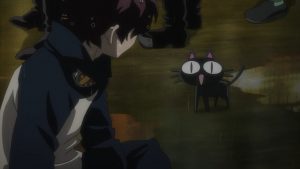 Well, let’s start off by stipulating to this – Kekkai Sensen and Beyond rocked. It was a great series in its own terms, another display of why Bones is the best studio in the business in terms of production quality, artistic integrity and consistency. One could focus on that and just that, and talk only about the mechanics of how this series was put together technically and narratively, and have no problem filling up the page.
Well, let’s start off by stipulating to this – Kekkai Sensen and Beyond rocked. It was a great series in its own terms, another display of why Bones is the best studio in the business in terms of production quality, artistic integrity and consistency. One could focus on that and just that, and talk only about the mechanics of how this series was put together technically and narratively, and have no problem filling up the page.
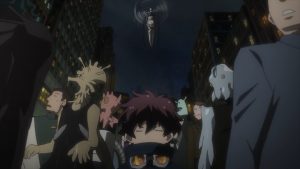 The thing is, though, that when it comes to Blood Blockade Battlefront & Beyond the picture gets even more interesting when you step back and look at the larger context. I’m a bit torn about how much I want to delve into this now and how much I want to save in case (cough) I end up writing about this show again before the year is over, but this is a series review post after all. And I don’t think one can do one of those about Kekkai Sensen without talking about the first season as well as the current one, because the relationship between the two is fascinating and highly unusual.
The thing is, though, that when it comes to Blood Blockade Battlefront & Beyond the picture gets even more interesting when you step back and look at the larger context. I’m a bit torn about how much I want to delve into this now and how much I want to save in case (cough) I end up writing about this show again before the year is over, but this is a series review post after all. And I don’t think one can do one of those about Kekkai Sensen without talking about the first season as well as the current one, because the relationship between the two is fascinating and highly unusual.
 To say the shadow of Matsumoto Rie hung over this season of BBB is hardly an overstatement, because it’s such a huge shadow – that’s how much of a talent she is. And she did the ED for this season, just to stamp her imprint on it – a season which, on the whole, was remarkably different in every way from the first without losing continuity between the two. I wrote once that what Matsumoto (and writer Furuya Kazunao) did was like an impressionist painting based on Nightow’s manga. If that’s the case, then Takayanagi Shigehito was like the Ansel Adams to her Van Gogh.
To say the shadow of Matsumoto Rie hung over this season of BBB is hardly an overstatement, because it’s such a huge shadow – that’s how much of a talent she is. And she did the ED for this season, just to stamp her imprint on it – a season which, on the whole, was remarkably different in every way from the first without losing continuity between the two. I wrote once that what Matsumoto (and writer Furuya Kazunao) did was like an impressionist painting based on Nightow’s manga. If that’s the case, then Takayanagi Shigehito was like the Ansel Adams to her Van Gogh.
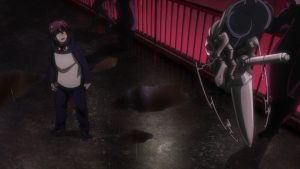 I’m not going to wade into the debate about which season was “better” (and I don’t think there’s any sort of clear gap, anyway) – what I’ll say is that they could hardly have been more different. Taken side by side it’s as if the two are textbook illustrations of two polar opposite ways to adapt a manga – an auteurist, almost iconoclastic personal statement vs. a loving, exquisitely executed linear bridge from the page to the screen. What results is a completely different experience for the viewer, but for me equally rewarding – and it’s a statement to how strong Nightow’s world-building skills are that it survives intact through both incarnations.
I’m not going to wade into the debate about which season was “better” (and I don’t think there’s any sort of clear gap, anyway) – what I’ll say is that they could hardly have been more different. Taken side by side it’s as if the two are textbook illustrations of two polar opposite ways to adapt a manga – an auteurist, almost iconoclastic personal statement vs. a loving, exquisitely executed linear bridge from the page to the screen. What results is a completely different experience for the viewer, but for me equally rewarding – and it’s a statement to how strong Nightow’s world-building skills are that it survives intact through both incarnations.
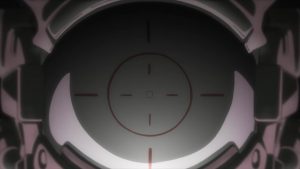 As a finale. this one delivers just about everything one could realistically want (unlike the first, which was a bit unsatisfying and had the added burden of three months of lead time before release). The raison d’etre of the second season was personal and interior – it was the chance for us to get to know both Nightow’s manga and its diverse cast much better than we could in the first season. But the final arc went solidly for epic, and delivered in spades – the plotting was tighter than the bedsheets in basic training, and it was a huge opportunity for Leonardo to shine as a character.
As a finale. this one delivers just about everything one could realistically want (unlike the first, which was a bit unsatisfying and had the added burden of three months of lead time before release). The raison d’etre of the second season was personal and interior – it was the chance for us to get to know both Nightow’s manga and its diverse cast much better than we could in the first season. But the final arc went solidly for epic, and delivered in spades – the plotting was tighter than the bedsheets in basic training, and it was a huge opportunity for Leonardo to shine as a character.
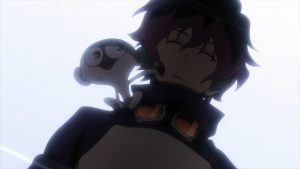 The battle of wits between Leo and Dr. Gaminozu was tense and compelling, especially with the stakes being as high as they were. Leo’s courage and cleverness have really only been in doubt by Leo himself, but those doubts are powerful. I liked the revelation of why Michella gave Leonardo his “Tortoise Knight” nickname – not in fact because he’s slow, but because a tortoise is unable to move backwards (I have no idea if that’s actually true or not, but I don’t suppose it matters much). Leo may not be fast or flashy, but he never runs away – he gathers himself, rides it out and plods forward to do what needs to be done.
The battle of wits between Leo and Dr. Gaminozu was tense and compelling, especially with the stakes being as high as they were. Leo’s courage and cleverness have really only been in doubt by Leo himself, but those doubts are powerful. I liked the revelation of why Michella gave Leonardo his “Tortoise Knight” nickname – not in fact because he’s slow, but because a tortoise is unable to move backwards (I have no idea if that’s actually true or not, but I don’t suppose it matters much). Leo may not be fast or flashy, but he never runs away – he gathers himself, rides it out and plods forward to do what needs to be done.
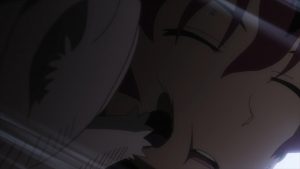 This is, effectively, a hostage standoff. But Leonardo’s mind is ever working, looking for an advantage – such as realizing (through Sonic’s perhaps unintentional assist) that Gaminozu’s drone didn’t have the same powers of vision he did. Leo has also cleverly managed to get a message to Klaus by inserting several blank lines in his message – “silent and deep” – and leaving the scene of the last Libra action without a word (perhaps Dr. Gaminozu’s understanding of humans is insufficient for him to realize that this is unusual behavior). What Leo needs to do is buy time, however he can, and hope his coded distress signal has gotten through to Klaus – and to this end he gets himself mugged, knowing it will cause a delay without doing anything to make Michella’s captor suspicious.
This is, effectively, a hostage standoff. But Leonardo’s mind is ever working, looking for an advantage – such as realizing (through Sonic’s perhaps unintentional assist) that Gaminozu’s drone didn’t have the same powers of vision he did. Leo has also cleverly managed to get a message to Klaus by inserting several blank lines in his message – “silent and deep” – and leaving the scene of the last Libra action without a word (perhaps Dr. Gaminozu’s understanding of humans is insufficient for him to realize that this is unusual behavior). What Leo needs to do is buy time, however he can, and hope his coded distress signal has gotten through to Klaus – and to this end he gets himself mugged, knowing it will cause a delay without doing anything to make Michella’s captor suspicious.
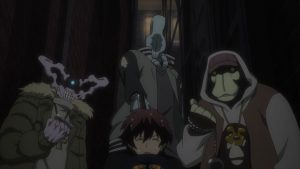 Ultimately, though, Leonardo is going to have no choice but to confront Gaminozu himself if he wants to buy enough time for help to arrive. And despite being comically overpowered, he does – making up in sheer ferocity and resourcefulness what he lacks in stature and destructive power. Say what you will about him, but this is classic Leo – his pain tolerance is off the charts, and he has no give-up in him whatsoever. Even as his eyes boil his flesh and his enemy’s talons cut him to ribbons he fights on (and Michella does her part, too), and justice prevails as Klaus and the cavalry arrive just in the nick of time.
Ultimately, though, Leonardo is going to have no choice but to confront Gaminozu himself if he wants to buy enough time for help to arrive. And despite being comically overpowered, he does – making up in sheer ferocity and resourcefulness what he lacks in stature and destructive power. Say what you will about him, but this is classic Leo – his pain tolerance is off the charts, and he has no give-up in him whatsoever. Even as his eyes boil his flesh and his enemy’s talons cut him to ribbons he fights on (and Michella does her part, too), and justice prevails as Klaus and the cavalry arrive just in the nick of time.
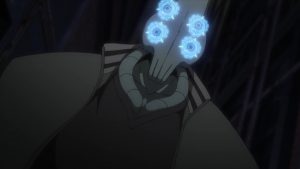 Klaus is one of those characters it’s almost impossible not to admire, so thoroughly decent and humbly heroic is he. He’s the picture of righteous indignation as he cleans Gaminozu’s clock, and almost like a father as he quietly tells the badly-wounded Leonardo what a hero he is in the aftermath. It’s fitting that this season should end on such a note, because it’s really been about the bonds between the characters to a much greater extent than the first was. Femt and Black make an appearance at the very last, to remind us that the larger story goes on – but this was a finale that was very much true to the season that built up to it.
Klaus is one of those characters it’s almost impossible not to admire, so thoroughly decent and humbly heroic is he. He’s the picture of righteous indignation as he cleans Gaminozu’s clock, and almost like a father as he quietly tells the badly-wounded Leonardo what a hero he is in the aftermath. It’s fitting that this season should end on such a note, because it’s really been about the bonds between the characters to a much greater extent than the first was. Femt and Black make an appearance at the very last, to remind us that the larger story goes on – but this was a finale that was very much true to the season that built up to it.
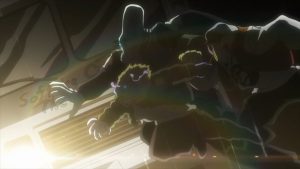 What happens now? Well, that’s hard to say – based on Vol. 1 sales this season will certainly be successful enough on disc to warrant a third (even with the expected sequel decline factored in). But at this point the entire original Kekkai Sensen manga has pretty much been adapted, and the “Back 2 Back” sequel is only a couple of volumes in, so it will likely be a while before we get another season. If and when we do, I’d certainly be pleased if Bones put Takayanagi-sensei in charge once more – he may not be the mad genius Matsumoto Rie is, but as a steward for this franchise, he may just be a better fit.
What happens now? Well, that’s hard to say – based on Vol. 1 sales this season will certainly be successful enough on disc to warrant a third (even with the expected sequel decline factored in). But at this point the entire original Kekkai Sensen manga has pretty much been adapted, and the “Back 2 Back” sequel is only a couple of volumes in, so it will likely be a while before we get another season. If and when we do, I’d certainly be pleased if Bones put Takayanagi-sensei in charge once more – he may not be the mad genius Matsumoto Rie is, but as a steward for this franchise, he may just be a better fit.


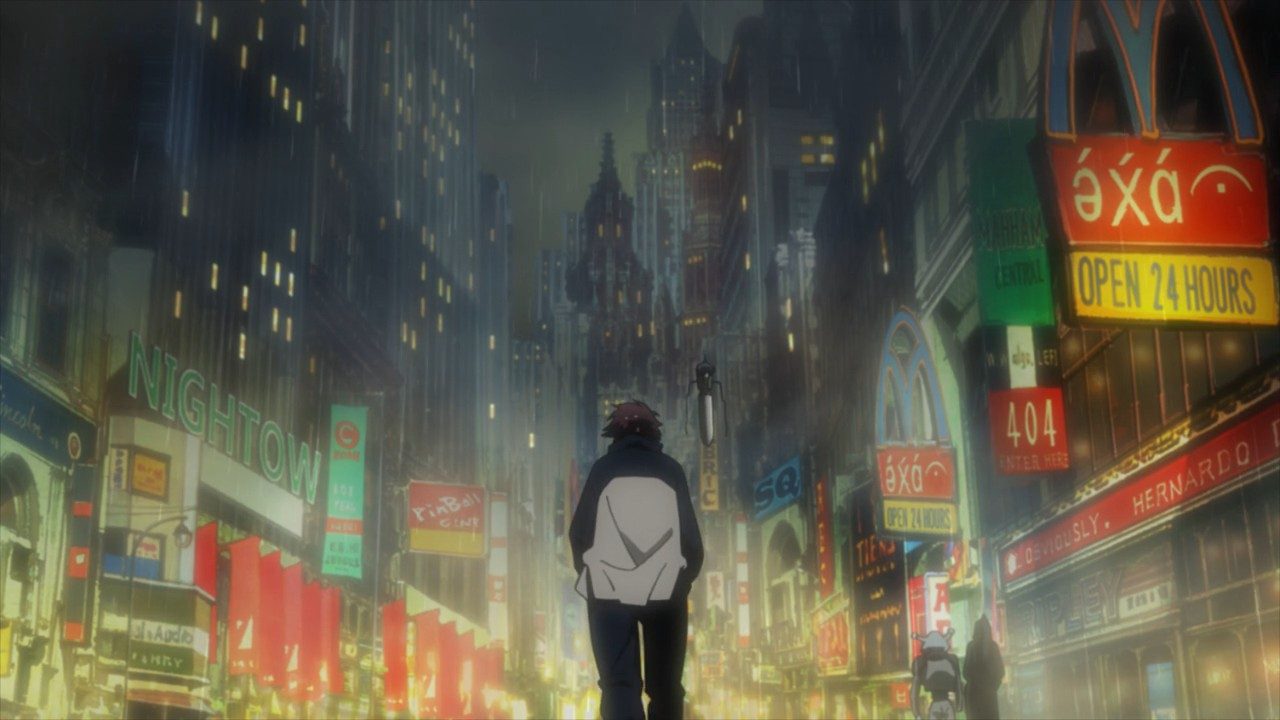
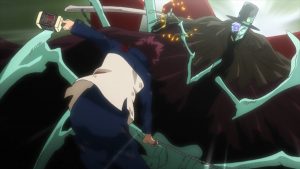
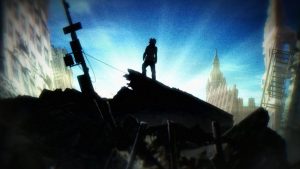
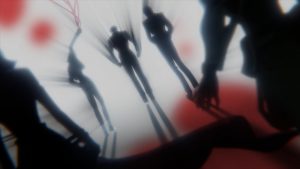
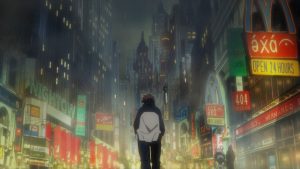




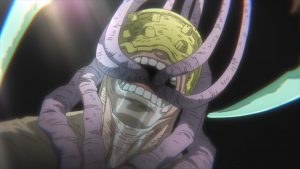
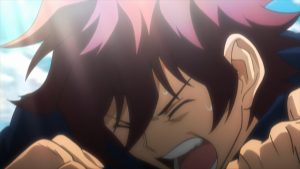
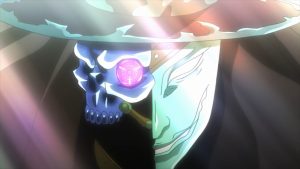
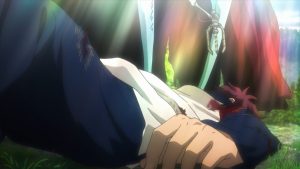
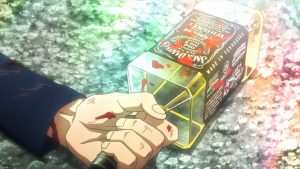

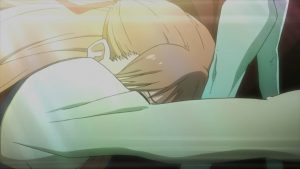
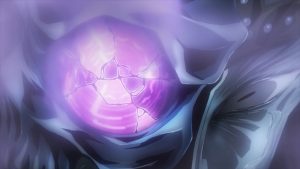
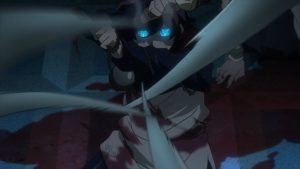


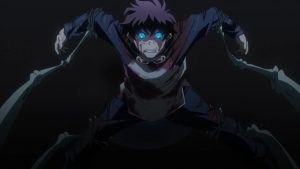
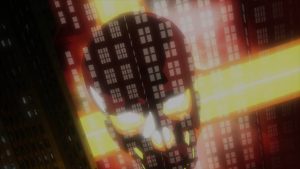
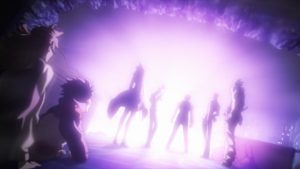
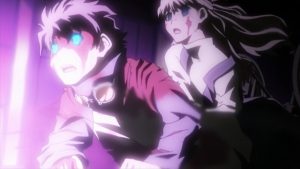



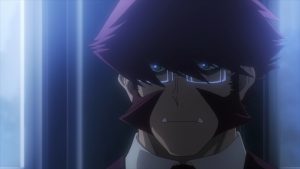
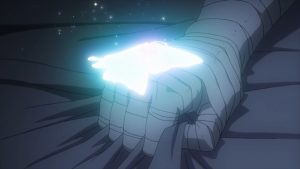
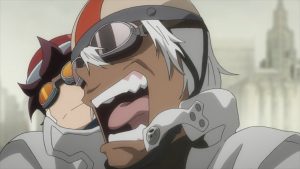
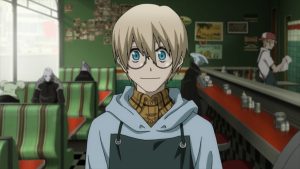
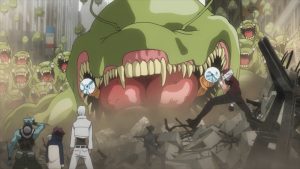
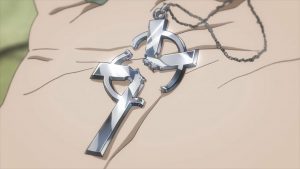

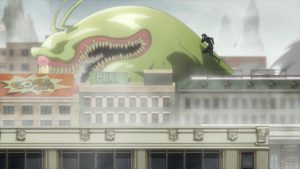
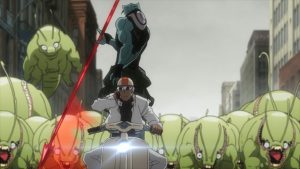
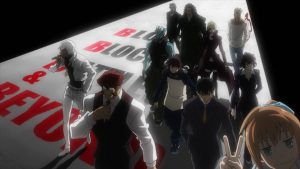
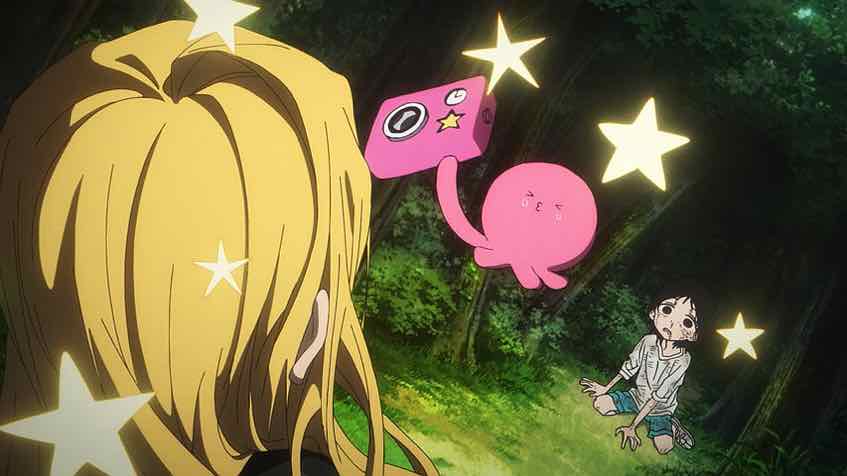
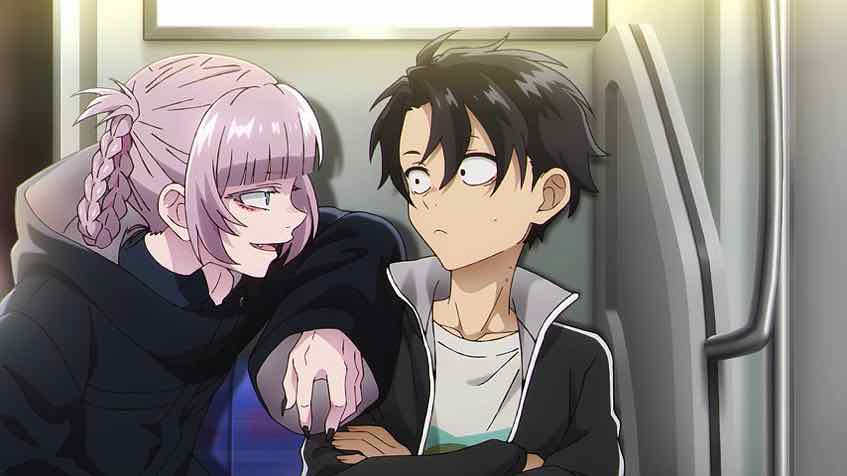
sonicsenryaku
December 23, 2017 at 6:30 pmHoly crap was this a balls-to-the-walls finale; I swear, Takayanagi is a man with directing prowess and a sharp intuition regarding how to stage epic scenes accentuating the best of its characters. It’s funny because contrary to the ostensible lack of a narrative arc this season that some fans complained about, it had silently been building a thematic one; that being of Leo finding his place in Libra and learning how to stand up for himself whenever the tables were turned against him; for him to realize that he too is a hero in his own right.As i always say, just because a series is episodic doesn’t mean there isn’t some thematic through line; even if it may not seem that obvious at first glance. As a matter of fact, a part of the fun of watching episodic series is going back to them and seeing how each episode built up towards a cathartic climax. Watching Leo come into his own this finale was nothing short of epic; the kind of triumphant epic where it’s less about huge, grand set pieces and more about a character being put through the ringer and coming out victorious against all odds. I couldn’t help but loudly exclaim to myself while watching this ep: “HOLY SHIT LEO IS A BADASS!! I don’t know Takayanagi pulled it off, but he was able to make this two-part finale feel so complete and briskly paced at the same time while not making the whole ordeal feel rushed, which did wonders in captivating me from start to finish.
Your remark regarding Matsumoto and Takayanagi’s take on Kekkai sensen is quite apt: to me, it feels like Matsumoto approached her season of kekkai sensen thinking: “I want to use Nightow’s manga to accentuate my eccentric yet visually creative sensibilities as well as my love for familial themes through my own original story.” Takayanagi on the other hand was more like: “I understand the appeal of Nightow’s manga and i want to do everything i can to bring that appeal to screen in the most stylish way possible.” I completely get what you mean by the structural philosophies behind the two seasons being really different but ultimately not diminishing the legacy of the work.
And so now…i eagerly wait for Bones’ next works in 2018; A.I.C.O, here I come. i don’t know why but i’m feeling something special about that series; something that screams 2003-2006 Bones’. My intuition usually is on the money when it comes to these things so here’s hoping
Jindujun93
December 25, 2017 at 12:16 amI have to say, this was a worthy finale for a great sequel season. Sure, Leo might not be my absolute favorite of the cast, but I always love it when he has his moments to shine, and this two-parter definitely delivered in that regard.
In general, the season had a lot to love about it. The increased focus on Chain and Steven in particular, though I also loved Bratatat Mom as far as episodes go. It just felt a lot more personal, as you’ve noted in a couple of your posts. Production quality was still stellar, same goes for the new tracks of the OST, and Takayanagi did a great job with his vision of Kekkai Sensen.
Special shoutout to the ending, though – I seriously love how many details they’ve crammed into it, so I always discovered something new whenever I watched it after every episode. It’s one of the very few EDs I never skipped, either.
Molly
December 27, 2017 at 4:07 amOh man… this episode had me on the edge of my seat. And how awesome was the scene when Zapp is pulling Leo out of harm’s way? Loved how they played it with the sound off. Leonardo is such a great character. He’s always so over his head but he manages to resiliently fight his way out of all sorts of messy situations. Definitely the best episode of Kekkai Sensen, period.
Overall, I am really fond of this season and as you so aptly put it, Enzo… the two seasons just can’t be compared to one other. It’s too bad so many people kept waiting for this season to be like the first when one could tell from the first episode that we were dealing with an altogether different beast. I’m pretty certain that if Takayanagi Shigehito would’ve attempted to replicate what Rie Matsumoto did in the first season, we would’ve gotten a hot mess on our hands because that’s not something one can just do at the snap of a finger. One is either Cezanne or one isn’t.
Thanks for reviewing it, Enzo.
P.S. Unison Square Garden have such a distinct sound. They’re awesome. Loved the op in Ballroom too.
P.P.S. Turtles can walk backwards… they just don’t have any incentive to do it too often.